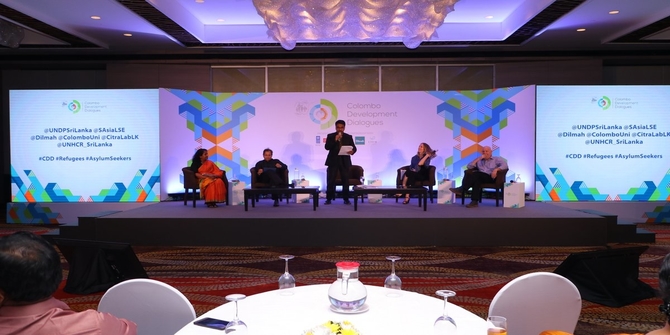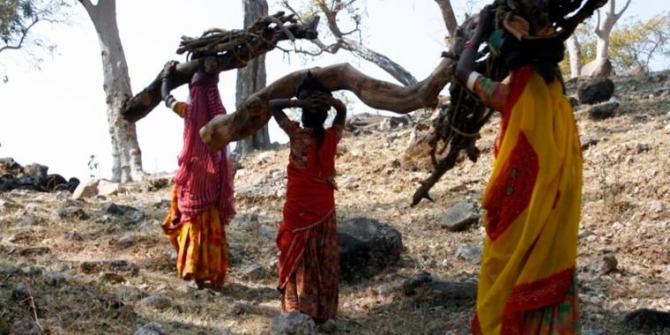 Shubhangi Agarwalla argues that the death penalty has bureaucratised death and in doing so, relieved individuals of a sense of their own moral responsibility within its delivery. Considering Derrida’s seminal argument on mercy, Indian society must reconsider the pivotal role of mercy within justice, writes Agarwalla.
Shubhangi Agarwalla argues that the death penalty has bureaucratised death and in doing so, relieved individuals of a sense of their own moral responsibility within its delivery. Considering Derrida’s seminal argument on mercy, Indian society must reconsider the pivotal role of mercy within justice, writes Agarwalla.
In India there has recently been such a sustained focus on the right to impose the death penalty that sometimes eclipses its essential corollary, namely the sovereign right to spare life. In India’s modern political system, this power to spare life remains in the form of executive clemency. Executive clemency, enumerated in Article 72 of the Indian Constitution, represents an escape valve where officials unaffiliated with the judiciary can survey the landscape and make decisions on factors beyond the law. Thus, the most logical use of clemency powers is when an individual wrongly convicted, can demonstrate that the system failed or, that they are innocent.
Critics, however, have argued that this conflicts with the demands of justice and equality – demands a liberal state presumably must heed. Due to mercy’s arbitrary and capricious nature, the state, they argue, should be lawful, not merciful. A study of the mercy petitions rejected by various Presidents in recent history lends some merit to their argument since it reveals a trend of politicisation of mercy.
Examining the cases
For example, the rejection of Saibanna Ningappa Natikar’s mercy petition came right after the December 16th gang rape of Nirbhaya; a time when the government needed a facile gesture to show that it was tough on crime against women. He had been sentenced to death for murdering his second wife and daughter after having been convicted for murdering his first wife, however his case was riddled with glaring judicial blunders from start to end. Both the trial court and the High Court convicted and sentenced Saibanna under s. 303 of the Indian Penal Code which provided for mandatory death sentence but had been struck down as unconstitutional some twenty years earlier. The Supreme Court took full notice of the s. 303 issue but then noted that the session’s court faulty finding did not prejudice the cause of the accused since there was no record of any mitigating circumstances. However what the Court failed to consider was that in cases under s. 303 there is no sentencing hearing, and hence no opportunity to bring on record mitigating circumstances. Moreover, the Court squarely based its death sentence verdict on the erroneous view that Saibanna, already undergoing a life sentence, could not be sentenced to life imprisonment again, and therefore the death sentence was the only available punishment.
Thus in effect, the Supreme Court revived mandatory death sentencing. So glaring were these errors that a campaign had been launched pursuant to which fourteen eminent retired judges of the High Court and the Supreme Court wrote to the President asking him to commute these death sentences. They said that it would be unconscionable and a blot on the administration of justice to execute Saibanna whose petition had been pending for 25 years. These factors should have necessitated the commutation of the death sentence by a government with even an iota of respect for the rule of law.
Similarly, Kashmiri separatist Afzal Guru, had been convicted on scanty evidence. It is widely acknowledged that President Pranab Mukherjee’s rejection of Afzal Guru’s mercy petition after seven-and-a-half years was in response to the pressure put on him by local politicians return for political support during his election campaign. In the aftermath of Afzal Guru’s execution, Omar Abdulla made a statement that the government must show that it was not selectively and unfairly targeting Muslims. Shortly after, and perhaps responding to this statement, Mukherjee promptly rejected the mercy petitions of Veerappan’s alleged Hindu and Christian associates who were also convicted under anti-terrorist legislation.
However, I argue that until the death penalty is abolished, we need mercy even if that means reimagining its landscape. We need mercy because: 1) as demonstrated in the cases above, the arbitrary, inconsistent and erroneous use of the death penalty necessitates an additional filter to correct miscarriages of justice; 2) it takes into account non-legal factors; and 3) it humanises the increasing bureaucratization of our lives.

A judge’s gavel. Photo credit, Wikimedia Commons, CC BY 2.0.
An examination of the aforementioned cases not only reveals politicisation of mercy by the Presidents but also a Shylockian belief of the public that extracting retribution to the fullest permissible extent will secure closure. But turning to Shakespeare once more, as Portia was quick to point out, there might be merit in not demanding our full pound of flesh. Mercy bends the arc of the moral universe to a more emphatic view of justice, not merely a retributive one. Formal justice is not equipped to calculate the punishment a person morally or justly deserves, because that would require an examination of the choices available to the offender, their character and the true nature of the harm they have caused. Formal justice does not necessitate an evaluation of the social, political, psychological and economic contexts underpinning the offence and the offender, and nor is it able to particularise the appropriate response in each case. Mercy enables consideration of matters not admitted in court, thereby facilitating a discussion of not merely reasons for the verdict but also equities of the punishment imposed.
Ajmal Kasab’s execution is a very interesting case to revisit in this regard. Kasab had of course committed an unpardonable crime, and, due to damning photographs and videographic evidence his guilt was not questioned. The Indian public was profoundly hurt and grieving. While his conviction was inevitable, the rejection of his mercy petition should not have been. The platitude that we are all products of our circumstances has much to offer here. This is not to suggest an absolute lack of human agency in things we do but to argue that the things we do are influenced by much more than just individual will. Our demands for justice should be tempered by this reality. In this context, having been sold to a terrorist organisation for a paltry sum when he was 13 years old, leading to a lifetime of abuse and brainwashing should Kasab not have been a candidate for mercy? Does this case not lie outside the realm of ‘normal’ or ‘ordinary’ cases for which the system for formal justice is aptly designed?
Pardoning the unpardonable?
Revisiting Derrida’s seminal work on forgiveness is illuminative in this regard. Exploring diverse manifestations of the pardon from the Japanese apology, the language of forgiveness in the South African Truth Commission, and the role of pardon in the mitigation of punishment, Derrida located a paradox about pardon – “it is necessary it seems to me, based on the fact that, yes, there is the unpardonable. Is this not in truth the only thing to pardon? The only thing which calls for the pardon?” (2001:46). In other words, it is only pardoning the unpardonable, exercising compassion without a ground, which gives pardon its true meaning.
Bereft of mercy, our society becomes impoverished and inhuman. The demise of mercy reflects the increasing depersonalisation and bureaucratisation of our culture. Ralph Hummel, in his critique of the bureaucratic society, notes that “bureaucrats are asked to take their guiding values from a reservoir of norms designed by the bureaucratic system. When these come into conflict with personal norms, the personal norms must be sacrificed” (2008:56)
Without mercy, the death penalty truly becomes a bureaucracy of death, with internally imposed norms and without personal reflection. This bureaucratisation affords everyone involved in imposing the death penalty the illusion that no one has decided that any given individual should die; it relieves them of responsibility.
Thus, the real import of my proposal lies in the Presidents’ assumption of responsibility to wrestle personally with the moral problems posed by the death penalty for the achievement of justice in the widest sense of the term. Most importantly, for mercy to survive in India, the Indian public may have to realise that mercy, sentiment, empathy, and emotion are worthy mirrors of their better selves.
This article gives the views of the authors, and not the position of the South Asia @ LSE blog, nor of the London School of Economics. Please read our comments policy before posting.
About the Author
 Shubhangi Agarwalla is a third year BA LLB student at National Law University, DelhiI. She has interned under and researched for Advocate Yug Mohit Chaudhury, a prominent abolitionist at the Bombay High Court.
Shubhangi Agarwalla is a third year BA LLB student at National Law University, DelhiI. She has interned under and researched for Advocate Yug Mohit Chaudhury, a prominent abolitionist at the Bombay High Court.







